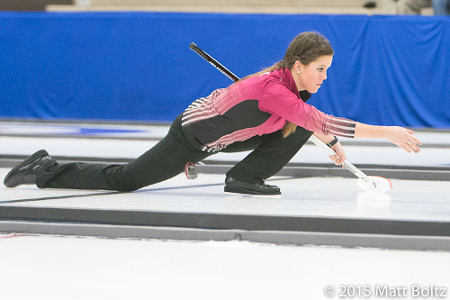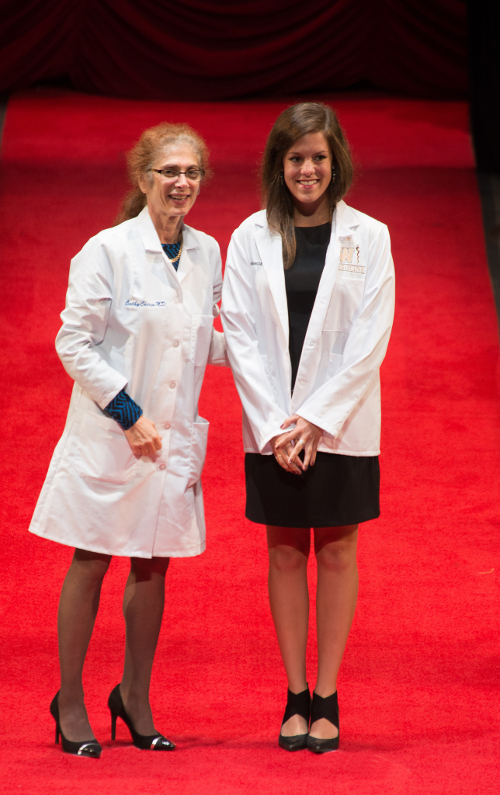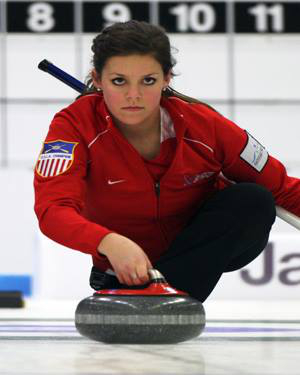
When she visited Kalamazoo in February 2015, Becca Funk was an aspiring doctor and one of the best curlers in the country.
The Madison, Wisconsin, native came to town for a week that year as a competitor in the U.S. Curling National Championships at Wings Stadium. By the time it was all done, she and her three teammates were champions and – after a celebratory dinner at Food Dance in downtown Kalamazoo – she discovered the medical school where she would start making good on her dream of becoming a physician.
“We drove by,” Funk said of WMed’s W.E. Upjohn M.D. Campus. “I was down here looking at it and I thought, ‘Well, that’s brand new and gorgeous.’”
Now, three years later, Funk calls Kalamazoo home and is nearing the end of her second year of studies at the medical school.
Funk says that since arriving at WMed, her love of the sport of curling has taken a back seat to school, but she continues to curl occasionally and volunteers at learn-to-curl sessions with the Kalamazoo Curling Club. And, she says, the lessons she has learned from the sport are serving her well as she navigates the rigors of medical school.
“Medicine more and more now is a very team-oriented field,” she said. “You need to be able to work with everyone. In curling, you have to be able to be the leader and also know when to defer. I definitely use that here.”
Funk said the decision to pursue a career in medicine began when she was an undergraduate student at the University of Wisconsin where she earned a bachelor’s degree in biology. During that time, she shadowed a bariatric surgeon at UW Health and she said the experience served as “a jumping off point” for her future.

“It wasn’t just a dream anymore,” Funk said. “It was something I actually wanted to pursue.”
After graduating from the University of Wisconsin, Funk took time off from school and worked at a local plasma center as a phlebotomist, then as a trainer and manager. She began applying for medical school in 2015, the same year she discovered the Upjohn Campus during her trip to Kalamazoo for the curling national championships.
For Funk, the curling national championships that year were part of a career in a sport in which she had competed from the age of 13. She said her father was the original curler in her family and the house they lived in in Wisconsin was next to the local curling club.
Funk has fond memories of her mother taking her and her brother to the curling club where they would watch their father compete. As a child, she said she would sit on the rock – the heavy, polished granite stone used in curling – as her father and his teammates moved the stone down the curling playing area, which is called a sheet.
Funk’s father passed his love of curling on to his daughter and by the time she was a teenager she was competing at the state level as a member of the Madison Curling Club.
“Madison is a cool place because we have a bunch of Olympians and world champions there,” Funk said. “It’s pretty hard for that drive and motivation not to rub off.”
Funk said her pursuit of the sport has also taken her to curling tournaments in Canada, world junior competitions in Scotland and Sweden, and the 2013 World University Games in Italy. She has also played in Minnesota, which is home to the national training center for USA Curling.
Curling has been an official sport in the Winter Olympic Games since the 1998 Winter Olympics in Nagano, Japan. The sport involves two teams, each with four players, who take turns sliding rocks across a curling sheet toward a circular target on the ice known as the “house.”
Each team has eight stones and, to win, the teams try to accumulate the highest number of points by getting their rocks as close to the center of the circular target as possible. Once a thrower sends a stone down the sheet, a team’s two sweepers use brooms to melt bumps in the ice to allow the rock to glide smoothly on the water that’s left behind. At the other end of the sheet from the thrower is the skip, or captain, who shouts commands to the sweepers as they work.
Funk said she typically worked as a thrower and sweeper during competitions.
“It’s kind of a neat aspect in that you each have your very own distinct job,” she said. “It’s very defined. I seemed to range around a lot. I liked sweeping, I was good at it.”
When she came to Kalamazoo in 2015, Funk said she had the honor of being part of a team that was led by Erika Brown who, at that time, was already a three-time Olympian and five time U.S. champion. A total of 10 teams each competed in the men’s and women’s championships that year at Wings Stadium.
“It was really cool to play with her,” Funk said. “She was one of my role models growing up.”

Now that she’s at WMed, Funk said she misses the regular competition that curling afforded her. Medical school and becoming a doctor are her focus now, but she said that she has no plans to give up the sport of curling and enjoys the chances she gets to play in Kalamazoo.
“Curling is nice in that it’s one of those sports you can continue when you’re older,” she said. “We have Olympians who are 40 or older and I think if I can just be smart about it, I could make that happen.”
For now, she said she will take what she learned as a curler – the importance of being part of a team and working together toward a common goal – to further her dream of becoming a doctor.
She comes from a family with deep roots in healthcare. Her mother is a nurse and she has an aunt who is a physician assistant and a cousin who earned a medical degree at the School of Medicine and Public Health at the University of Wisconsin and is now a physician completing a residency in obstetrics and gynecology.
She said she is happy to be at WMed, glad that it’s the place she chose to learn the science and the art of patient care that will lead to her becoming a caring and compassionate physician in the future.
“There’s just this kind of unwavering enthusiasm here,” she said. “The school is up and coming and I really get the feeling that they want to grow with their students and it’s a team effort, and they aren’t so set in their ways that they don’t want to hear what we have to say and it’s really neat and different.”
